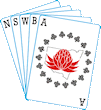|
Appeal #
|
Issue
|
Event
|
|
SNOT1
|
Unauthorised
information
|
Spring
National Open Teams
|
|
Stage
|
Round
|
Date
|
|
Qualifying
|
2
|
2013-10-23
|
|
CTD
|
M.
McManus
|
|
Committee
|
B.
Neill (c), A. Mill, B. Coles
|
|
Scribe
|
S.
Yuen
|
Board 8
Dealer W
Vul Nil
Scoring Teams,
imps converted to VPs on 2012 WBF 20-bd scale
|
|
North
|
|
|
♠
|
Q
|
|
♥
|
AQ962
|
|
♦
|
AQ
|
|
♣
|
AQT43
|
|
West
|
|
East
|
|
♠
|
JT83
|
♠
|
52
|
|
♥
|
-
|
♥
|
54
|
|
♦
|
JT8754
|
♦
|
K9632
|
|
♣
|
K86
|
♣
|
9752
|
|
|
South
|
|
|
♠
|
AK9764
|
|
♥
|
KJT873
|
|
♦
|
-
|
|
♣
|
J
|
| |
|
|
|
|
|
|
|
|
West
|
North
|
East
|
South
|
|
Pass
|
1H
|
Pass
|
5D(1)
|
|
Pass
|
6C(2)
|
Pass
|
6H(3)
|
|
Pass
|
7H
|
All
pass
|
|
(1)
Exclusion Roman Keycard Blackwood
(2)
Two keycards outside diamonds and the HQ
(3)
Agreed pause before bidding 6H
|
Table
result
|
7H=
by North, NS +1510
|
|
Director’s
ruling
|
6H+1
by North, NS +1010
|
|
Committee’s
ruling
|
6H+1
by North, NS +1010
|
The
Director: Was called to the table at the end of play. The players agreed that South’s 6H bid had
been slow and out of tempo. North
explained that he had sufficient extra values to bid 7H, even after the slow 6H
bid.
The Chief Tournament Director polled three top
players, giving them the North hand, the auction, and the explanations of 5D
and 6C. All three chose to pass.
Pass was therefore ruled to be a logical alternative
to the 7H call chosen at the table, as defined under Law 16B1(b). The unauthorised information created by the
break in tempo suggested bidding 7H over Pass, and the score was therefore
adjusted to 6H+1 by North, NS +1010.
The
appellants: Explained their exclusion keycard responses over 5D:
5H = no keycards, 5S = one, 5NT = two without the trump queen, 6C = two with
the trump queen. North can deduce that
South must have two keycards, as South must be prepared for a 5S response
showing only one.
South must also have a control in each black suit to
avoid two top losers in 6H. North
therefore has enough information, combined with the extras in his hand, to bid
7H.
The appeals advisor had been consulted. The appellants were advised that the appeal
had merit, but some players had been polled who thought that Pass was a logical
alternative.
The
respondents: Noted that the slow 6H suggested that all keycards
were held, allowing North an easy raise to 7H.
Had 6H been bid in tempo, North might have been worried that a keycard
was missing (e.g. the HK).
The
appeals committee: Questioned the appellants about the details of their
agreements. North-South had played
together for about three years, although not frequently.
North said that had he been 100% certain that 5D was
exclusion keycard, he would have bid 7H directly rather than showing his
keycards. Since he was almost certain of
his agreements, he decided to bid 6C; he could bid 7H next, unless partner bid
6D, in which case he could reconsider.
East-West pointed to hypothetical hands for South such
as AKJTxxx-JTxxx-void-K, or KJTxxxx-KJTxx-void-K. South asserted that she would have bid 1S on these
hands, and would not have regarded either as sufficiently good for 5D. The committee agreed, however, that the
appellants had not demonstrated a clear partnership agreement that the 5D bid
promised two keycards.
While North-South had a convincing argument that they
would have bid 7H regardless of the break in tempo, the definition of “logical
alternative” imposed by Law 16B1(b) asks whether “the class of players in question and using the methods of the
partnership” would give serious consideration to the alternative action (in
this case, Pass), and whether some might in fact select it. The committee agreed that the way in which
the Director’s poll had been conducted had demonstrated that this condition was
met.
The poll therefore established Pass as a logical
alternative. As a result, the committee
ruled that the Director’s decision should stand, NS +1010.
In reporting this appeal, it should
be emphasised that there is no suggestion that any player acted with an
intention to breach the proprieties. It is not unethical to hesitate if a
player needs to think. Unfortunately however the hesitation may convey
information to partner, and the Laws of Bridge may then sometimes prevent their
partner from taking an action that the partner would always have taken in good
conscience.





